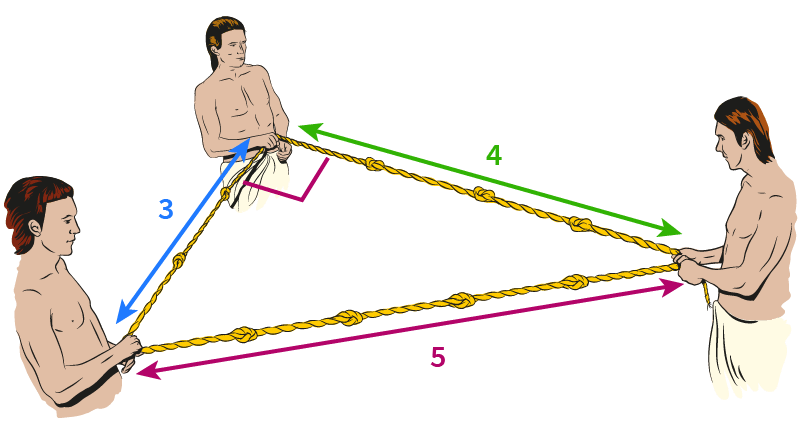Pythagoras-The Story of Mathematics-Urdu

فیثاغورث- تاریخ کا پہلا ریاضی دان و یونانی فلسفی
He was a disciple of Anaximander, his astronomy was the natural development of Anaximander’s. Also, the way in which the Pythagorean geometry developed also bears witness to its descent from that of Miletos. The great problem at this date was the duplication of the square, a problem which gave rise to the theorem of the square on the hypotenuse, commonly known still as the Pythagorean proposition (Euclid, I. 47). If we were right in assuming that Thales worked with the old 3:4:5 triangle, the connection is obvious.
First Pure Mathematician
Pythagoras of Samos is often described as the first pure mathematician. He is an extremely important figure in the development of mathematics yet we know relatively little about his mathematical achievements. Unlike many later Greek mathematicians, where at least we have some of the books which they wrote, we have nothing of Pythagoras’s writings. The society which he led, half religious and half scientific, followed a code of secrecy which certainly means that today Pythagoras is a mysterious figure. He was born on the island of Samos, Greece in 569 BC. Various writings place his death between 500 BC and 475 BC in Metapontum, Lucania, Italy. His father, Mnesarchus, was a gem merchant. His mother’s name was Pythais. Pythagoras had two or three brothers.
Cosmology of Pythagoras
There is more difficult with the cosmology of Pythagoras. Hardly any school ever professed such reverence for its founder’s authority as the Pythagoreans. ‘The Master said so’ was their watchword. On the other hand, few schools have shown so much capacity for progress and for adapting themselves to new conditions. Pythagoras started from the cosmical system of Anaximenes. Aristotle tells us that the Pythagoreans represented the world as inhaling ‘air’ form the boundless mass outside it, and this ‘air’ is identified with ‘the unlimited’. When, however, we come to the process by which things are developed out of the ‘unlimited’, we observe a great change. We hear nothing more of ‘separating out’ or even of rarefaction and condensation. Instead of that, we have the theory that what gives form to the Unlimited is the Limit.
Art of Music and Medicine
That is the great contribution of Pythagoras to philosophy, and we must try to understand it. Now the function of the Limit is usually illustrated from the arts of music and medicine, and we have seen how important these two arts were for Pythagoreans, so it is natural to infer that the key to its meaning is to be found in them. It may be taken as certain that Pythagoras himself discovered the numerical ratios which determine the concordant intervals of the musical scale. Similar to musical intervals, in medicine, there are opposites, such as the hot and the cold, the wet and the dry, and it is the business of the physician to produce a proper ‘blend’ of these in the human body.
- (1) that at its deepest level, the reality is mathematical in nature,
- (2) we can use philosophy for spiritual purification,
- (3) that the soul can rise to union with the divine,
- (4) that certain symbols have a mystical significance, and
- (5) that all brothers of the order should observe strict loyalty and secrecy.
Escape from Tyrannical Rule
Pythagoras emigrated to southern Italy about 532 BCE, apparently to escape Samos’s tyrannical rule. He established his ethico-political academy at Croton (now Crotone, Italy). It is difficult to distinguish Pythagoras’s teachings from those of his disciples. None of his writings have survived, and Pythagoreans invariably supported their doctrines by indiscriminately citing their master’s authority. Pythagoras, however, is generally credited with the theory of the functional significance of numbers in the objective world and in music. Other discoveries often attributed to him were probably developed only later by the Pythagorean school. The incommensurability of the side and diagonal of a square, for example, and the Pythagorean theorem for right triangles. More probably, the bulk of the intellectual tradition originating with Pythagoras himself belongs to mystical wisdom rather than to scientific scholarship.
Note: This article was originally published on our related blog. We have merged content from our educational subdomains to provide easier access in one place. The original post is still available at: http://www.books.urdutubes.com/2019/04/pythagoras-the-story-of-mathematics-urdu.html
All content is owned and authored by us, and redistribution or reuse is not allowed without permission.
Note: This post is part of our content merger from multiple educational subdomains. To access the original content, visit: books.urdutubes.com for book-related content, PDFs, and downloads, or videos.urdutubes.com for video-related posts. All content is owned and authored by us, and redistribution or reuse is not allowed without permission.
Leave a Reply
You must be logged in to post a comment.